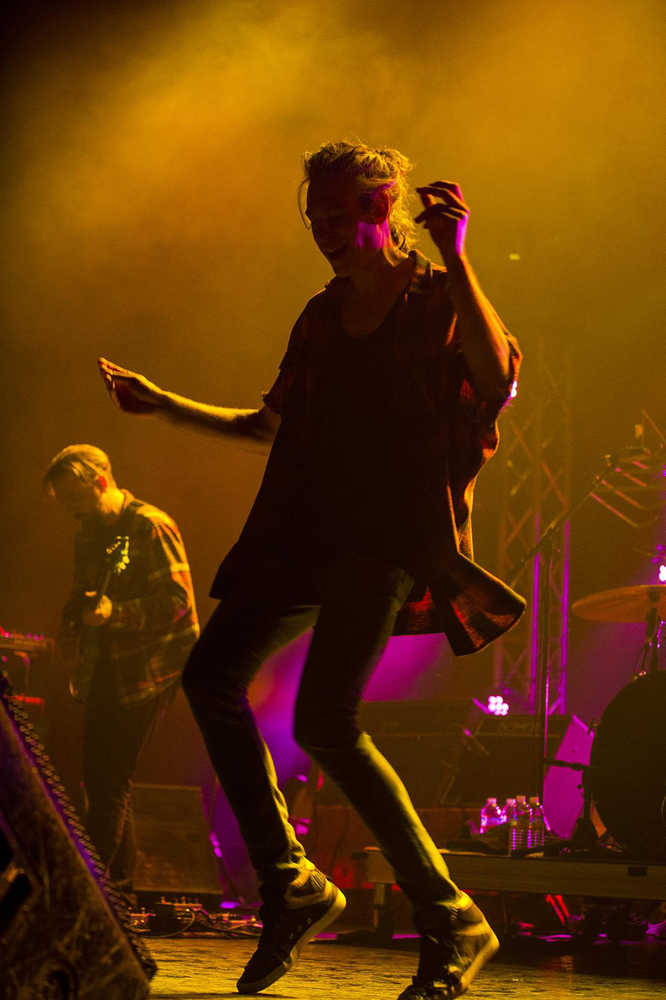The first time I caught Matisyahu — Christmas Eve, 2003 at a club in Brooklyn — he was like nothing I’d ever seen. And musically, I’d seen a lot: a heavy metal barbershop quartet; a bluegrass jazz combo led by a Tuvan throat singer; a guy who played John Coltrane’s “Giant Steps” on a dental dam. But Matisyahu represented an even less likely amalgam. He was a Hasidic Jewish reggae singer, arguably the first and only one on earth. (Quick ethnographic aside: Hasidism is an ultra-observant, religiously conservative sect of Judaism originating in 18th century Eastern Europe; reggae is a genre of pop music with roots in 1960s Jamaica).
More Talmudic scholar than front-man, Matisyahu took the stage in full Hasidic regalia — black suit, black hat, black overcoat, long beard and ear-locks (“peyos” in Hebrew). But once the band kicked in, rabbi could shred, alternating between chant-like roots reggae and a more frenetic “dub” style, except with lyrics about the return of “Moshiach” (the Messiah). He sang in Hebrew, Yiddish and even Aramaic. He beat-boxed like a boss. He lit a menorah (it was also Hanukkah). And he danced wildly, with a hand tightly clamped to his “yarmulke” in gesticulations simultaneously evocative of Soul Train and Fiddler on the Roof.
Naturally, I thought he’d make a great magazine pitch; an editor for the “New Yorker” agreed. So I arranged to meet Matisyahu — he was 24 at the time and still in yeshiva (religious school); I was 27 — and we whiled away an afternoon at 770 Eastern Parkway in Prospect Heights, Brooklyn, central headquarters of the Chabad-Lubovitch Hasidic movement. We discussed the respective influence of Bob Marley and Rabbi Shlomo Carlebach on Matisyahu’s music; we compared Judaism and Rastafarianism, which share surprising similarities (e.g. dietary codes, Star of David imagery, a cultural longing for “Zion”); we drank coffee. Then I spent the next six months writing and revising a 1000-word article.
The rest, as they say, is history. Matisyahu went on to become a Grammy-nominated musician, releasing four studio recordings, two live albums and, about a year after I met him, the Top 40 single “King Without a Crown.” He’s toured the globe and headlined festivals. “Esquire” magazine once called him “the most intriguing reggae artist in the world.”
My “New Yorker” piece, on the other hand, ultimately got bumped in favor of a different profile about a rapping imam. And then I moved to Alaska. C’est la vie (or, as they say in Hebrew, “eleh ha-chaim”).
Well, now, more than ten years later, our paths cross again — in Juneau, of all places — as Matisyahu opens the Juneau Arts & Humanities 2016-17 season at Centennial Hall this coming Friday, Sept. 23 at 7 p.m.
Co-sponsored by KTOO/KRNN/KXLL, he and guitarist Aaron Dugan bring a stripped-down acoustic version of the full touring act, which next heads to the One Love Experience in California followed by a performance at the Sultan’s Pool in Jerusalem.
“Figuring out the logistics was a real headache,” said Cheryl Snyder, KTOO Assistant General Manager for Arts and Culture and a self-confessed fan.
“But we were determined to bring Matisyahu up here,” she said. “He’s such a unique artist.”
Of course, there’s something else I should mention, which lends him yet another level of complexity: Matisyahu isn’t Hasidic anymore. Actually, there’s something else I should mention: he didn’t start out Hasidic, either. Like me, Matisyahu originally hails from a secular Jewish family in suburban New York; he first came to Hasidism in his early twenties as a “baal teshuva,” or convert.
In fact, Matisyahu (given name Matthew Miller) broke with the movement in 2011, posting a selfie to Twitter in which he appeared without his trademark beard. He’s been clean-shaven pretty much ever since.
“I don’t see it as leaving [Hasidism], exactly,” Matisyahu told me last week via email. Another difference between then and now: he wasn’t nearly as easy to track down for an interview.
“Anytime you dedicate, sacrifice and give yourself over to something, it becomes a permanent part of who you are as a person,” he continued. “In that way, Judaism and ‘hasidishkite’ will always be part of my whole being, my essence, for as long I live.”
Still, strict adherence to religious law certainly must have complicated the life of a rock star. For instance, observance of the Sabbath precluded performing after sundown on Friday nights. Interesting tidbit: Matisyahu once made an exception to this rule during a 2007 tour in Alaska, because the sun didn’t set until 2 a.m.
This trip to the Last Frontier features no such restrictions.
“Even though it’s far away, I like the idea of coming to Alaska again,” he said. “I know I have fans up there, and fans want to hear the music. I look forward to giving it to them.”
As of press time, Matisyahu at Centennial Hall is sold out. However, people are encouraged to show up at 6:30 p.m. to sign the waitlist.

